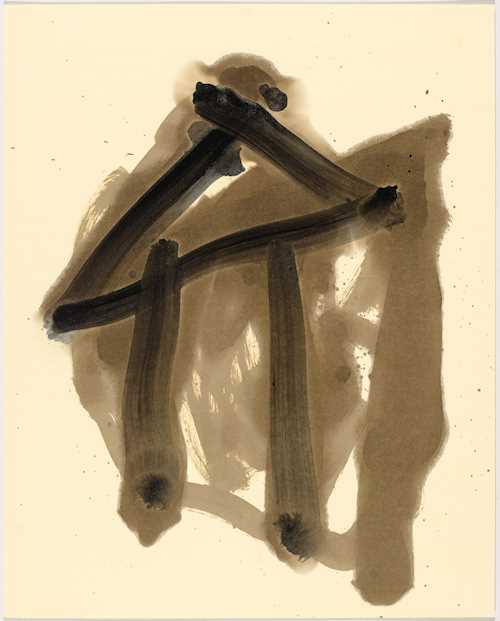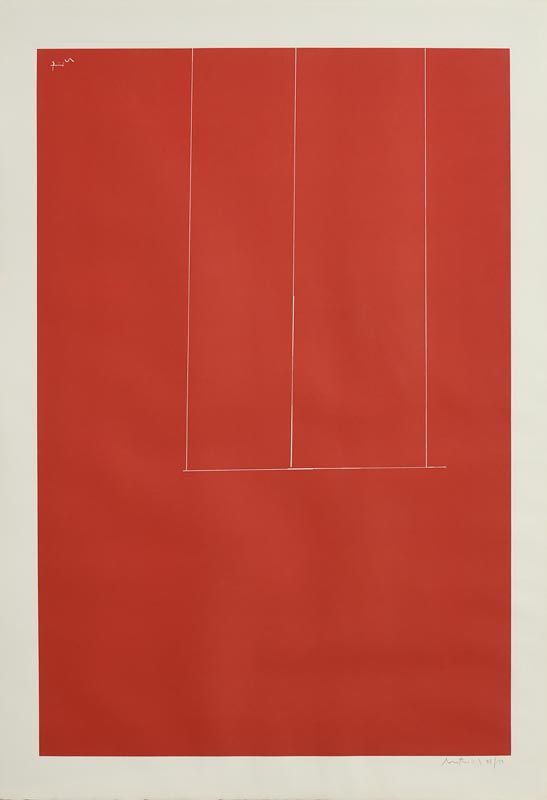Robert Motherwell Frontier No. 12 1958 Oil on primed board. 38.1 × 45.7 cm (15 × 18 in). Signed, titled and dated ‘FRONTIER, No. 12 Robert Motherwell 1958’ on the reverse.
Provenance Sidney Janis Gallery, New York; Private Collection; Locks Gallery, Philadelphia; Private Collection Exhibited New York, Sidney Janis Gallery, Robert Motherwell 9 March – 4 April 1959; Baltimore,The Baltimore Museum of Art, Robert Motherwell Meanings of Abstraction, 21 May – 30 July 2006 Literature Robert Motherwell Paintings and Collages, New York: Dedalus Foundation (catalogue raisonné in preparation) Catalogue Essay Motherwell was part of the first wave of Abstract Expressionists, including Mark Rothko Jackson Pollock and Barnett Newman whose work emerged after the Second World War throughout the 1940s. Clement Greenberg, in his championing of the work of the Abstract Expressionists, described how “content is to be dissolved so completely into form that the work of art or literature cannot be reduced in whole or in part to anything not itself” (‘Avant-Garde and Kitsch’, 1939). This radical approach, inspired by the practice of the European avant-garde, was in reaction to the social realist art which at the time dominated America’s art scene. In 1948 Motherwell began a series of paintings which would come to define nearly twenty years of his career. The series comprised over one hundred paintings known as the Elegies to the Spanish Republic (1948–1967). Frontier No. 12 was painted in 1958 in the middle of this long period. The paintings were visual representations of Motherwell’s lamentation of the atrocities which took place during the Spanish Civil War (1936–39). For Motherwell, the Spanish Civil War raised moral issues in the sense “that the world could, after all, regress”, and in 1948 he completed a small drawing accompanied by a poem written by Harold Rosenberg. It was this work that triggered the start of his painting series which formed Motherwell’s personal expression of deep sympathy towards the suffering that took place throughout the brutal war. As seen in Frontier No. 12, his use of black paint on a white canvas is symbolic of his practice, and of this body of work in particular. The stark contrast between the black paint against the white canvas becomes a visual metaphor of he starkness between life and death. Frontier No. 12 is a powerful abstract commemoration to the human suffering induced by war. Motherwell’s legacy remains amongst the work of the Abstract Expressionists who “sought to invent art that would reassert the highest ideals of humankind, create a new beginning and prove human beings capable of greatness and beauty” (Art Gallery of Ontario curatorial statement, quoted by Lee Parsons, ‘Robert Motherwell and the Abstract Expressionists’, World Socialist Web Site, August 2011). “Motherwell’s allusion to human mortality through a non-referential visual language demonstrates his admiration for French Symbolism, an appreciation he shared with his fellow Abstract Expressionist painters. Motherwell was particularly inspired by the Symbolist poet Stéphane Mallarmé’s belief that a poem should not represent some specific entity, idea, or event, but rather the emotive effect that it produces.” (Nancy Spector on Robert Motherwell Guggenheim Collection Online) Read More
Robert Motherwell Frontier No. 12 1958 Oil on primed board. 38.1 × 45.7 cm (15 × 18 in). Signed, titled and dated ‘FRONTIER, No. 12 Robert Motherwell 1958’ on the reverse.
Provenance Sidney Janis Gallery, New York; Private Collection; Locks Gallery, Philadelphia; Private Collection Exhibited New York, Sidney Janis Gallery, Robert Motherwell 9 March – 4 April 1959; Baltimore,The Baltimore Museum of Art, Robert Motherwell Meanings of Abstraction, 21 May – 30 July 2006 Literature Robert Motherwell Paintings and Collages, New York: Dedalus Foundation (catalogue raisonné in preparation) Catalogue Essay Motherwell was part of the first wave of Abstract Expressionists, including Mark Rothko Jackson Pollock and Barnett Newman whose work emerged after the Second World War throughout the 1940s. Clement Greenberg, in his championing of the work of the Abstract Expressionists, described how “content is to be dissolved so completely into form that the work of art or literature cannot be reduced in whole or in part to anything not itself” (‘Avant-Garde and Kitsch’, 1939). This radical approach, inspired by the practice of the European avant-garde, was in reaction to the social realist art which at the time dominated America’s art scene. In 1948 Motherwell began a series of paintings which would come to define nearly twenty years of his career. The series comprised over one hundred paintings known as the Elegies to the Spanish Republic (1948–1967). Frontier No. 12 was painted in 1958 in the middle of this long period. The paintings were visual representations of Motherwell’s lamentation of the atrocities which took place during the Spanish Civil War (1936–39). For Motherwell, the Spanish Civil War raised moral issues in the sense “that the world could, after all, regress”, and in 1948 he completed a small drawing accompanied by a poem written by Harold Rosenberg. It was this work that triggered the start of his painting series which formed Motherwell’s personal expression of deep sympathy towards the suffering that took place throughout the brutal war. As seen in Frontier No. 12, his use of black paint on a white canvas is symbolic of his practice, and of this body of work in particular. The stark contrast between the black paint against the white canvas becomes a visual metaphor of he starkness between life and death. Frontier No. 12 is a powerful abstract commemoration to the human suffering induced by war. Motherwell’s legacy remains amongst the work of the Abstract Expressionists who “sought to invent art that would reassert the highest ideals of humankind, create a new beginning and prove human beings capable of greatness and beauty” (Art Gallery of Ontario curatorial statement, quoted by Lee Parsons, ‘Robert Motherwell and the Abstract Expressionists’, World Socialist Web Site, August 2011). “Motherwell’s allusion to human mortality through a non-referential visual language demonstrates his admiration for French Symbolism, an appreciation he shared with his fellow Abstract Expressionist painters. Motherwell was particularly inspired by the Symbolist poet Stéphane Mallarmé’s belief that a poem should not represent some specific entity, idea, or event, but rather the emotive effect that it produces.” (Nancy Spector on Robert Motherwell Guggenheim Collection Online) Read More






.jpg)






.jpg)

Try LotSearch and its premium features for 7 days - without any costs!
Be notified automatically about new items in upcoming auctions.
Create an alert